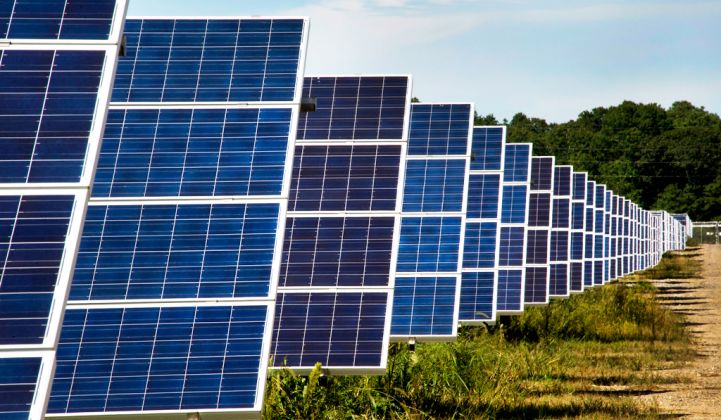Arcadia, a startup with software that’s connecting hundreds of thousands of U.S. households to cleaner, cheaper energy options, raised $30 million Tuesday to fuel its expanding community solar and retail energy services business.
Over the past three years, the Washington, D.C.-based startup has built a novel business in the energy services space based on software that can aggregate, analyze and package a variety of energy options for U.S. residential utility customers in different states and utility markets.
This has led to a rapidly expanding role for Arcadia as a “community solar manager,” as CEO Kiran Bhatraju describes it. From a few hundred subscribers for a couple of megawatts' worth of community solar pipeline back in 2016, Arcadia has grown to hundreds of thousands of customers, financing hundreds of megawatts of community solar for its developer partners.
Tuesday’s funding round will allow Arcadia to expand its community solar work to new states, Bhatraju said in an interview. Right now, the startup (which changed its name from Arcadia Power this week) serves customers in New York, Maryland, Rhode Island and Washington, D.C. By next year, it plans to expand to Illinois, New Jersey, Colorado and Massachusetts as well, he said.
Community solar programs differ from state to state, but Arcadia and its partners work in markets that allow “virtual net-metered” projects, Bhatraju said. In simple terms, these programs are aimed at providing a solar option for the roughly 50 to 75 percent of U.S. households that aren’t a good fit for rooftop solar, whether it’s because the homeowners live in a multitenant building, their roof is shaded, or they simply can’t afford it.
Arcadia doesn’t finance or build these projects. Rather, it works with developers to connect them with a critical asset: buyers for their solar power. “They come to us to get the customers to buy power at scale,” he said.
Community solar has been growing rapidly in the past few years, despite its limited markets, surpassing 1 gigawatt in installed capacity last year. As the market has matured, so has the sophistication of the relationship to their customers, Bhatraju noted.
The first generations of community solar programs required would-be customers to have high credit scores and sign contracts with termination fees for early departure. But these attempts to solidify what could otherwise be an uncertain set of offtakers for a large-scale solar project also turned many otherwise worthy customers away, Bhatraju said.
These onerous requirements have eased in recent years, with fewer community solar projects requiring termination fees or credit scores. One of Arcadia’s contributions to this trend, Bhatraju said, was its realization that one of the best indicators of a customer’s ability to keep paying their utility bills, and thus to remain current on their community solar obligations, was whether they’ve ever missed a past utility payment — a much simpler method of qualifying customers than FICO scores or restrictive contract terms.
As Arcadia has grown in scale, it’s also been able to offer community solar developers the benefit of a constantly growing pool of potential customers. That’s an important capability for projects seeking to eliminate termination fees and otherwise give customers the right to depart whenever they want, whether because they’ve changed their minds about solar or because they’re moving to a new home, as happens every five years or so for the typical American family.
“The offtake is liquid and fungible: Customers can slide in and out,” he said. “Our software makes that possible for the first time.”
Community solar isn’t Arcadia’s only focus. The startup still offers customers in all 50 states the earliest iteration of its virtual power-purchase agreement products, which include wind and solar purchases on users' utility bills.
Arcadia also credits itself as the country’s largest residential broker for retail electricity providers in states with competitive energy markets, with more than $200 million in utility payments to date running through its software.
But Arcadia doesn’t engage with retail energy providers — or community solar projects, for that matter — unless it can offer customers not only cleaner, but also cheaper, energy than their default utility option, Bhatraju said. “Retail should only exist if you can beat the local utility price.”
The same reasoning has led Arcadia to avoid community solar markets featuring utility-owned projects that cost more than standard rates. “We don’t want to promote community solar as a premium product because we know it’s a savings product at heart."
Arcadia plans to release new energy subscription models in 2020; it will also expand financing options for in-home devices such as smart thermostats, LED lighting and other energy-saving gear, he said.




